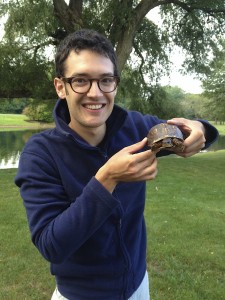At the Evolution 2014 conference, Yale graduate student Daniel Field was awarded the W.D. Hamilton Award for his research elucidating the origins of bird flight. Field’s work on allometry produced results suggesting that powered flight in birds originated significantly later than is currently assumed.
Initially, Field and his colleague Colton Lynner were researching the best way to estimate the body masses of extinct birds and bird-like dinosaurs. Through their investigations, they realized that in flying birds, there was a consistent, precise relationship between body mass and shoulder dimensions which did not appear in flightless birds.
Following this discovery, they realized their work could have broader implications for determining the evolutionary origins of flying ability. They compared the relationship between body mass and skeletal dimensions in extinct birds and early feathered dinosaurs to those of living birds. Based on their work, they were able to determine which extinct organisms would have been capable of modern avian flight.
“What I think this project really taught me, and I think it’s an important thing, is that when you’re open-minded with the data you’re collecting, and constantly trying to explain the origins of important evolutionary features, you can stumble upon really elegant and profound explanations for the origins of interesting traits,” Field said.
Although preliminary, Field’s research has the potential to serve as a foundation for understanding how flight originated, thanks to our understanding of where birds fit on the evolutionary tree of life.
“Before you can get at really exciting evolutionary questions, you need to have a rigorous idea of how your living and fossil organisms are interrelated,” Field said. “Once you’ve got that, you can open the floodgates to all kinds of interesting explanations about how or why the interesting traits of those organisms first arose.”
Field, a fourth-year graduate student in the Department of Geology & Geophysics at Yale, hopes to pursue a career investigating the evolutionary origins of birds, and their characteristic features. He says that his research is hard to classify: It’s more paleontological than that of most ornithologists, but more focused on Earth’s living biodiversity than that of most paleontologists. However, Field says that having a foot in both fields is beneficial.
“There aren’t many paleontologists out there who spend their spare time bird watching, and there aren’t many bird watchers who spend their research time studying Archaeopteryx, but really, when I think about what I’m doing now, it’s that combination that makes my work interesting. There’s nothing I’d rather be doing than those two things.”

